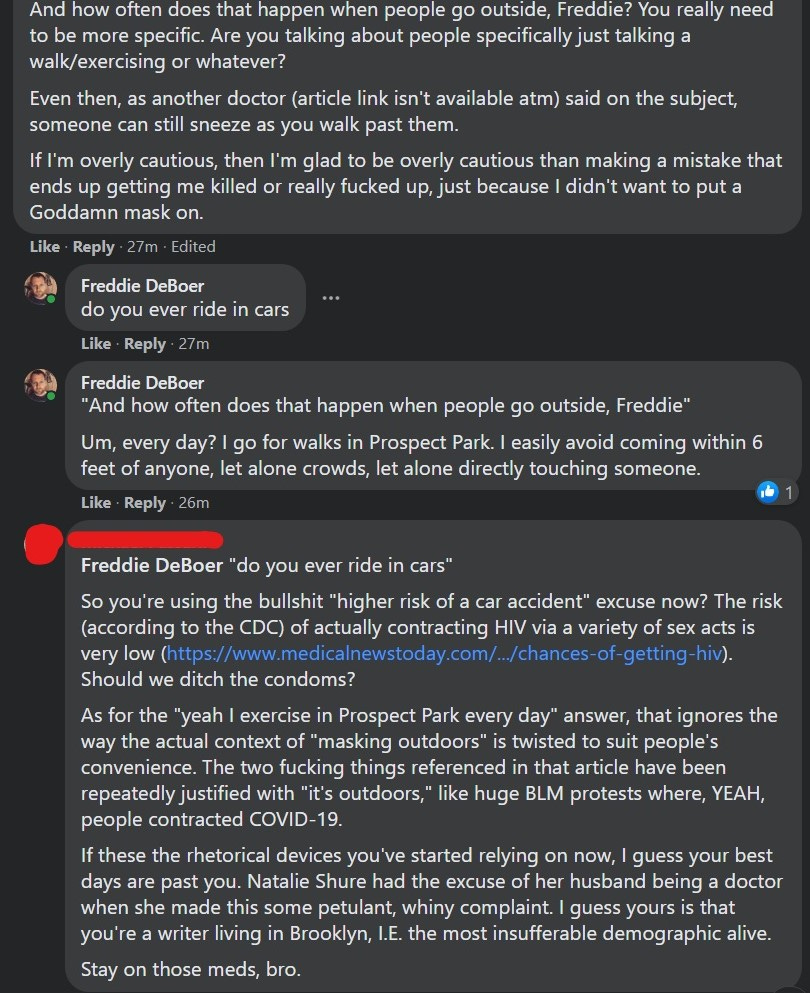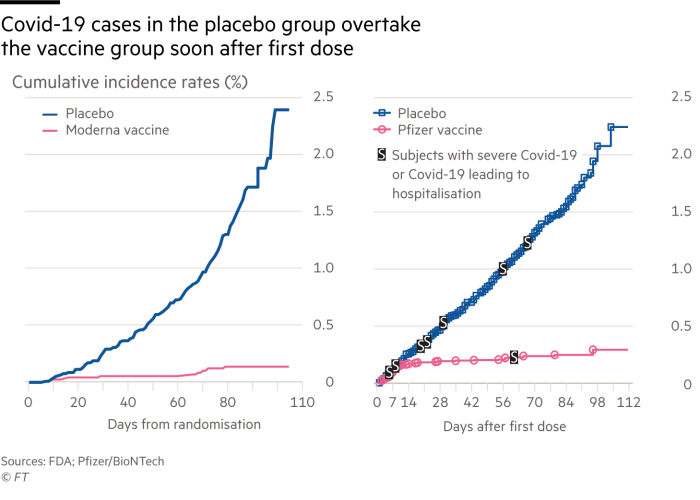The above, uh, free exchange of ideas was inspired by me sharing this New York Times story on masks outside, and the specific quote, “The results are that this risk is negligible in outdoor air if crowds and direct contact among people are avoided.” For context, these were his first two missives on the subject; there was no prior escalation. I had specifically said that you should know well enough not to get into crowded outdoor situations like concerts. This was insufficient to avoid his wrath. For the record these were also his last two missives, as I blocked him. Life’s too short. (I have not said, and would never say, that someone should not wear a mask if they would prefer to. But allow me to walk through the park without a mask when medical experts say I can. And I’m vaccinated.)
I have already ranted about those who seem to derive immense, perverse pleasure out of moralizing about Covid, enforcing pessimism with utter gusto and strutting around as if treating the most unpleasant future as the likeliest future is a mark of moral sophistication. These are the people who, when the vaccines first began to trickle out, stood around saying “you know those vaccines won’t help against the variants, and those variants are already everywhere, and if you think you’ll ever sit inside and eat at a restaurant again, you should have your head examined….” This particular psychology I find both utterly simple and totally mysterious: simple, because people love judging others like they love the sea, the sun, and the sky, and mysterious, because it’s such an oddly specific set of tics and slogans that have been communally developed, as though shitty virus meme talk is being injected into their skulls through the apparatus from The Matrix. Relative risk assessment is privilege; “sticking to the science” means hewing always to the error bars on the worst side; your mask is your true face; there is never not some new danger lurking around the corner that you must treat as immensely serious no matter how speculative it might be. The crime is not believing that better times are here. The crime is wanting better times to be here.
You would think the introduction of highly effective vaccines would dramatically alter the rhetoric for all of us. Yet for some of our loudest warriors, it has not. Not at all.
I think civic life is a requirement of democracy: human beings must regularly interact with those they would not ever socialize with by choice to remind themselves that they are part of a politic that is bigger than themselves, that out there lies the vast beating heart of people they do not know and would not particularly like if they did, but who are owed all the same rights and opportunities as they themselves. The country needs that. You need that. I need that. We need to go to the bank and wait on line and grumble at the impossible sloth of the people doing their transactions ahead of us, and when we are strong enough we need to forgive them. Because democracy is not a set of rights but a single responsibility, which is the responsibility to respect the lives of those around you as you value yours yourself. This is unachievable; it is your responsibility nonetheless. To really feel this profound obligation you have to see other faces. I was already desperately afraid for this basic facet of a healthy civil society before Covid, with all of our apps and gadgets and services designed to sever us from strangers. And now the Covid moralist says, never again. You must live in a bubble, away from them, and even worse from many that you love, and even your bare desire to be free of this brutal hindrance is disordered. I don’t think speech is ever violence, but this is an era in which a misplaced emoji is considered violence. Yet this is not violence. “Say goodbye forever” is not violence.
Two of 2020’s biggest stories, Covid and George Floyd, brought the question of public moralizing to the forefront of my consciousness, and I can’t get rid of it. We need responses to socially undesirable behavior that aren’t legal in nature, which means sometimes we must bring social censure to bear. And I’m glad that a grudging and partial taboo arose in 2020 about wearing a mask when appropriate, just as I’m grateful that we have at least grudgingly and partially adopted a taboo against the most naked and awful displays of interpersonal racism. And yet in both cases it seems clear to me that something has gone badly wrong. In neither case is moralism working to create a moral world; in both the heavy hand of judgment merely sharpens the teeth of opposition and somehow steals from us our ability to see each specific situation with virgin and curious eyes. I am not a joiner, and there are many like me, and we would like a society that is both moral and free, one that brings all of social judgment’s meager powers to bear on plague denial and racism both, but without forgoing the indispensable human quality of discrimination. We would like to feel free to think before we judge. And I would like to run my hand unafraid through the tall wheat of humanity in the golden field that is this city once again before I die….
I am traveling until at least May 3rd and will not be available to read comments. Comments are therefore unmonitored and unmoderated until I return. If you feel that a comment has violated Substack’s Content Guidelines, please email tos@substack.com.






This topic has come up on Slow Boring as well and I wrote on the comments there that my husband and I (both doctors, happily married) fought over and over about relative risks this past year. Part of the problem was that CDC and public health had a difficult messaging job. In every case, they erred on the side of caution, even when the science clearly showed an activity was fairly safe. So when I advocated for doing something like seeing relatives unmasked after we were all vaccinated (before CDC changed their guidelines), my husband would accuse me of making up rules rather than listening to experts. And when I said, life is about risk calculation, he would say, "sure, but when we go skiing, for example, we risk our own lives and well being, not others."
One of the reasons that I took the CDC recommendations this past year with a grain of salt is that I'm a primary care doctor. I've already absorbed that experts make guidelines, but if you expect to get 100% compliance with guidelines, you're going to fail as a doctor. Case in point: I had a patient early in the pandemic that had almost every risk factor you could imagine: age>65, obese, diabetes, lung disease... She lived alone with lots of family nearby. She wanted her family to come visit and I initially said no. Too dangerous. Well, she got so depressed that her health was compromised by that. So that strict edict obviously had to be modified. We had to find a way where she could see family, but do it as safely as possible. The vaccines are a true miracle and I do think things will loosen up, but we'll probably be masked indoors for a while yet.
You should always immediately block anyone who makes a remark like "Stay on those meds, bro". Fuck those people.